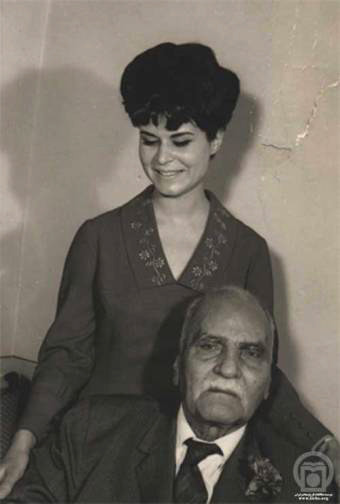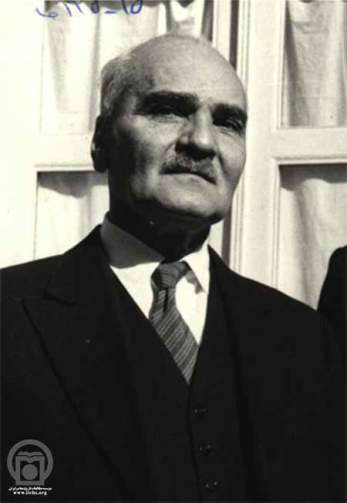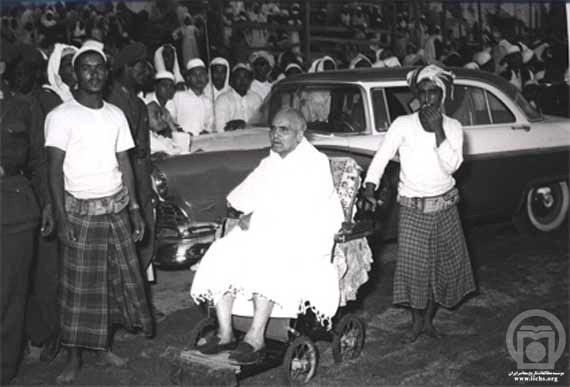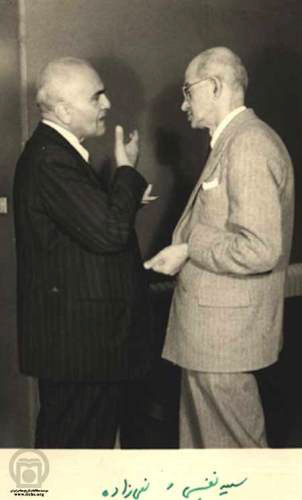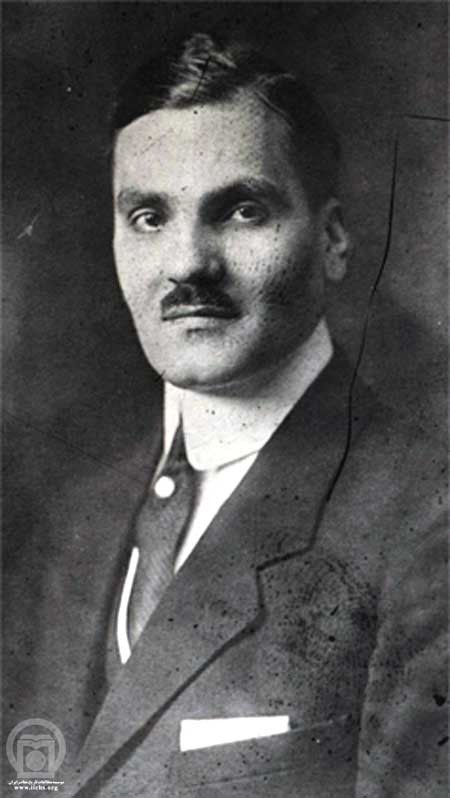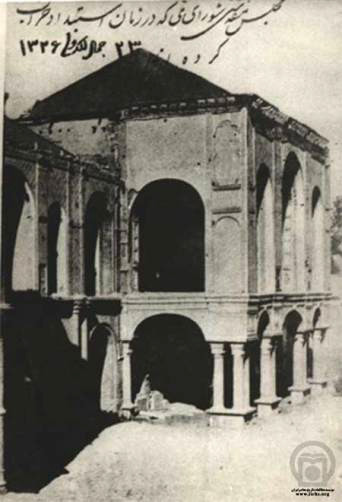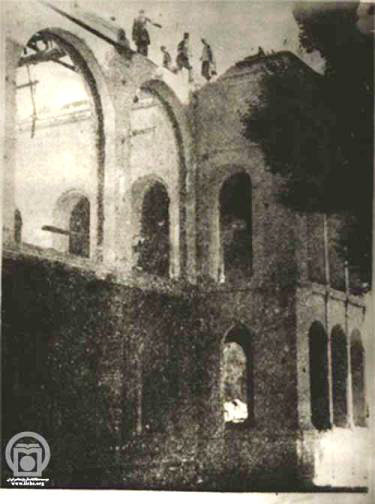Son of Seyyed Taqi Ordubadi, Seyyed Hassan Taqizadeh, was born in a religious family in Tabriz, September 1877. His education began when he was only four years old. He opened a small bookshop with his brother in law, Mohammad Ali Tarbiat in Tabriz. He made acquaintance with many intellectuals and liberal minded people in his bookshop, and became aware of socio_ political changes of European countries, and became enchanted by their culture. Gradually, the bookshop was developed and turned out to be a center to promote new ideas. He published Ganjineh ye Fonun with Tarbiat, Etesam-ol-Molk and Sharifzadeh in Tabriz.
He went to Caucasus, Cairo, Beirut, and Damascus, and met Sheikh Mohammad Abduh and some other freedom loving men. He was a member of first Majlis from Tabriz Merchants' guild. He was appointed a member to the board which was formed to prepare the amendment to the constitution. He opposed to the conformity of the enacted laws with the religious rules and became known as an atheist. Following the bombardment of Majlis, he took refuge in the British Legation; and under its protection he went toLondon, where he has been exiled to, via Rasht and Anzali.
When constitutional movement was strengthened in Iran, he returned to Iran. He was a member of the second term of Majlis. At the same time there was an attempt on the life of Ayat-ollah Seyyed Abdollah Behbahani. The rumors were spread around that he had a hand in this affair. Inevitably, he had to get a leave from Majlis and left for Istanbul, and then Europe and United States. This time his visit lasted for fourteen years. He published Kaveh in Persian. He married a German woman and called her Attieh. While in Europe, he went to Moscow as an envoy from Iran to conclude commercial, consular and postal contracts. He was elected a member to the third Majlis from Tabriz, but he did not return to Iran. He was elected from Tehran for the third, fourth, and fifth terms of Majlis. In the fifth Majlis, he opposed to the change of the Qajars to the Pahlavis.
He was minister for foreign affairs, 1926; governor general of Khorassan, 1928; Iranian minister toLondon, 1929; Minister of roads, 1930; and minister of finance, 1923. As a minister of finance, he granted the oil concession to the British for 60 more years. This act of him destroyed his reputation. Inevitably, he went to France as a minister. After a while, he was recalled by Reza Shah to Iran, but he remained in Europe for fear of his life. Then he went to teach in Cambridge. Subsequent to Reza Shah's resignation, he became Iranian minister to London for the second time. In Qavam's cabinet, he was appointed minister of finance, but he rejected and did not come to Iran. While keeping his appointment, he headed a high ranking delegation to the United Nations and defended Iran's case against the Soviet occupation of Iranian territory and tried hard to safeguard Iran' integrity and independence.
In the fifteenth Majlis, many members opposed to his credentials for his grant of oil concession to the Russians. In defending himself, he said he had been a tool.
When the senate was formed in Iran, he was a member to it from 1949 to 1967, being its chairman for six years.
He was intelligent, clever, and had a good memory. He died in Feb 6th, 1970 when he was 92 years old.
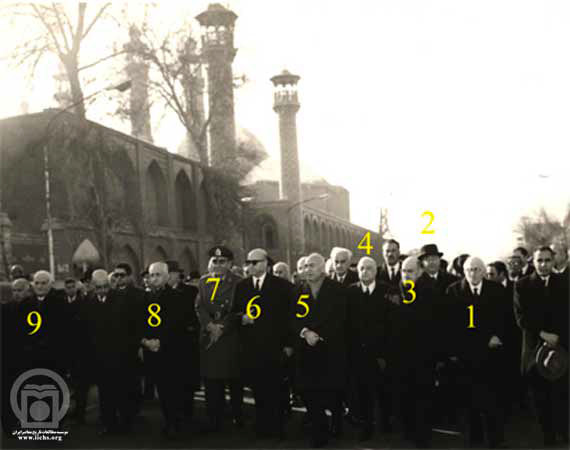
Seyyed Hassan Taqizadeh
AA [11-4548]
Seyyed Hassan Taqizadeh's funeral across from Sepahsalar Mosque: 1. Eisa Seddiq, 2. Ali Ashraf Ahmadi, 3. Saeed Malek, 4. Mohsen Rais, 5. Abdollah Riazi, ,6. Jafar Sharif Imami, 7. Fereidun Jam, 8. Morteza Yazdan Panah, 9. Mohammad Nakhjavan
Seyyed Hassan Taqizadeh's funeral across from Sepahsalar Mosque: 1. Eisa Seddiq, 2. Ali Ashraf Ahmadi, 3. Saeed Malek, 4. Mohsen Rais, 5. Abdollah Riazi, ,6. Jafar Sharif Imami, 7. Fereidun Jam, 8. Morteza Yazdan Panah, 9. Mohammad Nakhjavan
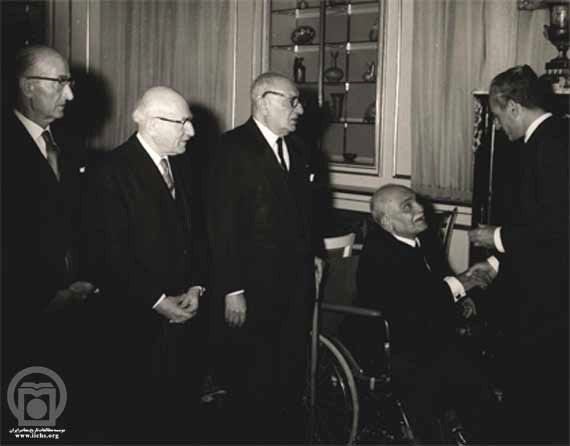
Seyyed Hassan Taqizadeh
S [118-389]
Meeting of elderly statesmen with Mohammad Reza Pahlavi, on the right: Mohammad Reza Pahlavi, Hassan Taqizadeh, Ali Asghar Hekmat, Eissa Seddiq and AliAkbar Siassi
Meeting of elderly statesmen with Mohammad Reza Pahlavi, on the right: Mohammad Reza Pahlavi, Hassan Taqizadeh, Ali Asghar Hekmat, Eissa Seddiq and AliAkbar Siassi
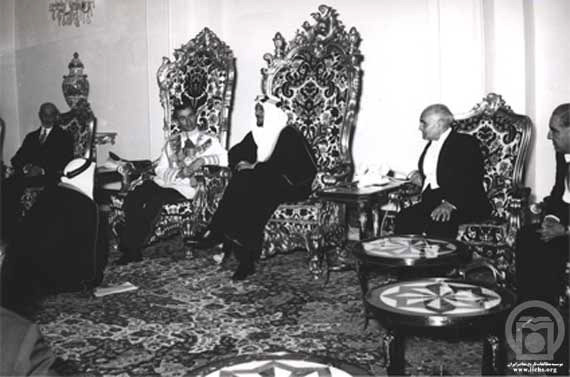
Seyyed Hassan Taqizadeh
AA [11-491]
Mohammad Reza Pahlavi and his company in a visit to Malek Saud (king of Saudi Arabia): Manucher Iqbal, Hassan Taqizadeh, Malek Saud, Mohammad Reza Pahlavi and Mohsen Sadr
Mohammad Reza Pahlavi and his company in a visit to Malek Saud (king of Saudi Arabia): Manucher Iqbal, Hassan Taqizadeh, Malek Saud, Mohammad Reza Pahlavi and Mohsen Sadr
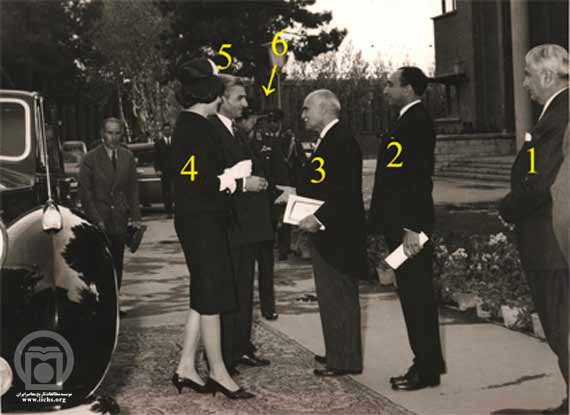
Seyyed Hassan Taqizadeh
AA [11-960]
Mohammad Reza and Farah Pahlavi in their visit to the Tehran University; 1. Mohammad Jafar Behbahanian, 2. Assadollah Alam, 3. Hassan Taqizadeh, 4. Farah Pahlavi, 5. Mohammad Reza Pahlavi, 6. mansur Afkham Ibrahimi
Mohammad Reza and Farah Pahlavi in their visit to the Tehran University; 1. Mohammad Jafar Behbahanian, 2. Assadollah Alam, 3. Hassan Taqizadeh, 4. Farah Pahlavi, 5. Mohammad Reza Pahlavi, 6. mansur Afkham Ibrahimi
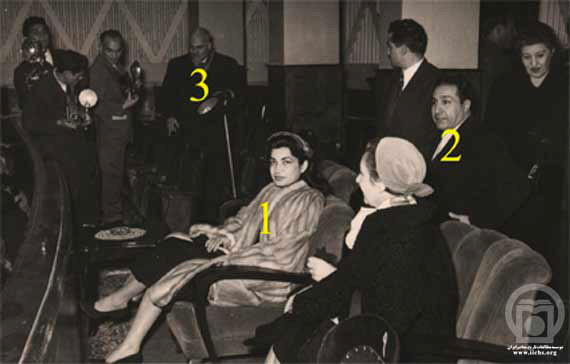
Seyyed Hassan Taqizadeh
AA [11-1350]
Seyyed Hassan Taqizadeh and Ashraf Pahlavi in the opening ceremony of Assadollah Rashidian's cinema: 1. Ashraf Pahlavi,, 2. Assadollah Rashidian, 3. Hassan Taqizadeh
Seyyed Hassan Taqizadeh and Ashraf Pahlavi in the opening ceremony of Assadollah Rashidian's cinema: 1. Ashraf Pahlavi,, 2. Assadollah Rashidian, 3. Hassan Taqizadeh
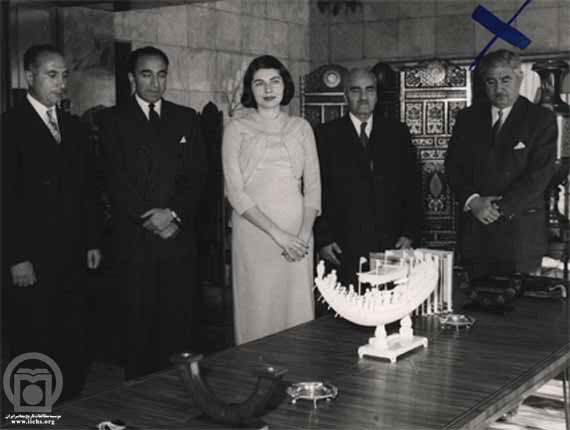
Seyyed Hassan Taqizadeh
AA [11-2788]
Sorayya Isfandyari and her company in a visit: Mohammad Jafar Behbahanian, Hassan Taizadeh, Sorayya Isfandyari and assadollah Alam
Sorayya Isfandyari and her company in a visit: Mohammad Jafar Behbahanian, Hassan Taizadeh, Sorayya Isfandyari and assadollah Alam
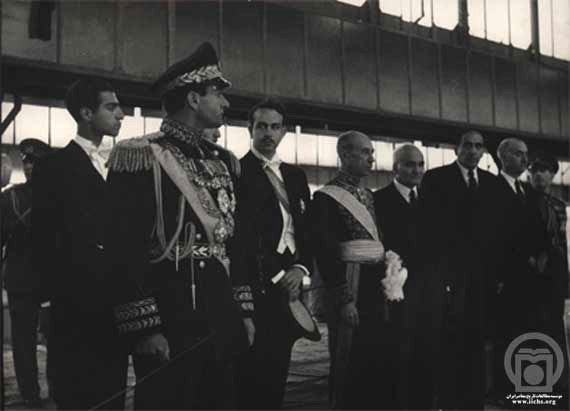
Seyyed Hassan Taqizadeh
AA [11-5385]
Mohammad Reza Pahlavi in an official ceremony accompanied by the prime minister and the speakers of the senate and Majlis (1953), on the right: HajebAli Razm ara, Mohammad Ali Varasteh, Abdollah Moazzami, Hassan Taqizadeh, RajabAli Mansur, Mehrdad Pahlbod, Mohammad Reza Pahlavi and Ahmad Reza Pahlavi
Mohammad Reza Pahlavi in an official ceremony accompanied by the prime minister and the speakers of the senate and Majlis (1953), on the right: HajebAli Razm ara, Mohammad Ali Varasteh, Abdollah Moazzami, Hassan Taqizadeh, RajabAli Mansur, Mehrdad Pahlbod, Mohammad Reza Pahlavi and Ahmad Reza Pahlavi
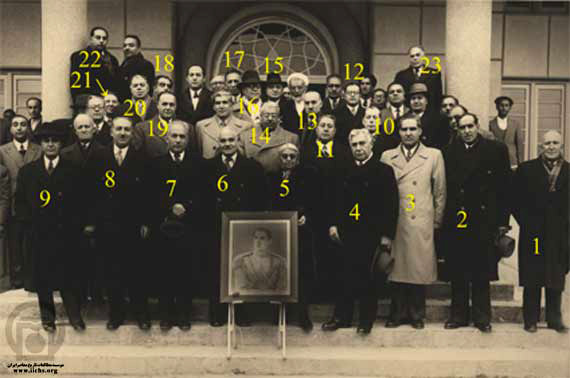
Seyyed Hassan Taqizadeh
AA [1-1415]
The attendants at the opening ceremony of Amin-od-dowleh school: 1. AbdolHossein Sheibani, 2. Abdollah Moazzami, 3. Manucher Iqbal, 4. Mohammad Saeed Maraqei (the prime minister), 5. Ashraf Fakhr-od-dowleh (Ali Amini's mother, 6. Hassan Taqizadeh, 7. Sadeq Rezazdeh Shafaq, 8. Hashem Malek Madani, 9. Mohammad Ibrahim Amir Teimur Kalali, 10. Nader Arasteh, 11. Reza Hekmat, 12. AbdolHamid Zanganeh, 13. Javad Ganjei, 14. Abbasqoli Golshaian, 15. Ali Asghar Hekmat, 16. Ahmad Matin Daftari, 17. Javad Ashtiani, 18. Ali Amini, 19. Ahmad Moqbel, 20. Abbas Nafissi, 21. Ali Vakili, 22. Mahmud Amini, 23. Javad Ameri
The attendants at the opening ceremony of Amin-od-dowleh school: 1. AbdolHossein Sheibani, 2. Abdollah Moazzami, 3. Manucher Iqbal, 4. Mohammad Saeed Maraqei (the prime minister), 5. Ashraf Fakhr-od-dowleh (Ali Amini's mother, 6. Hassan Taqizadeh, 7. Sadeq Rezazdeh Shafaq, 8. Hashem Malek Madani, 9. Mohammad Ibrahim Amir Teimur Kalali, 10. Nader Arasteh, 11. Reza Hekmat, 12. AbdolHamid Zanganeh, 13. Javad Ganjei, 14. Abbasqoli Golshaian, 15. Ali Asghar Hekmat, 16. Ahmad Matin Daftari, 17. Javad Ashtiani, 18. Ali Amini, 19. Ahmad Moqbel, 20. Abbas Nafissi, 21. Ali Vakili, 22. Mahmud Amini, 23. Javad Ameri
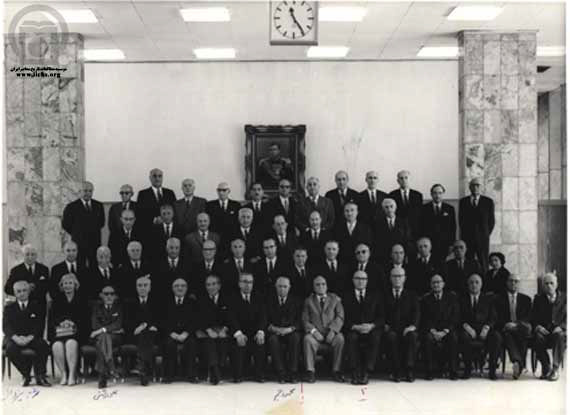
Seyyed Hassan Taqizadeh
AA [11-4677]
Members of the fourth period of the Senate at the Majlis Library April 25th 1967; from bottom and right: Baqer Shahrudi, Mohammad Ali Allame Vahidi, Mohsen Raiss, Saeed Malek, Ahmad Matin Daftari, Jafar Sharif Imami, Hassan Taqizadeh, Mahmud Jam, Mohammad Saed, Reza Bushehri, Eissa Sediq, AliAkbar Seif Afshar, Ali Dashti, Shams-ol-Moluk Mosahab, Morteza Yazdanpanah, Mehrangiz Manuchehrian, Mohammad Abbassi, Javad Ashtiani, Emad Torbati, Mohammad Ali Buzari, Mohammad Saeedi , Mehdi Namazi, AliAshraf Ahmadi, Iraj Matbui, Mostafa Qoli Ram, Aliqoli Hedayat, Amanollah Jahanbani, Mohammad Saed, Mohammad Hejazi, Ibrahim Nabil Samiei, Mohsen Hejazi, Reza Jafari, Parviz Yarshater, Shokrollah Safavi, Abbas Massudi, Ali Amir Hekmat, Mahmud Mirjalali, Hassan Baqai, Rostam Guive, Hassan Akbar, Fathollah Forud, Yahya Adl, Parviz Kazemi, Jamshid Alam, Mahmud Jalili, Karim Varahram, GholamAli Radi Azarakhshi, Abbas Nafissi, Jahanshah Sasam Bakhtiari, Mohammad Ali Momtaz, Mostafa Tajaddod
Members of the fourth period of the Senate at the Majlis Library April 25th 1967; from bottom and right: Baqer Shahrudi, Mohammad Ali Allame Vahidi, Mohsen Raiss, Saeed Malek, Ahmad Matin Daftari, Jafar Sharif Imami, Hassan Taqizadeh, Mahmud Jam, Mohammad Saed, Reza Bushehri, Eissa Sediq, AliAkbar Seif Afshar, Ali Dashti, Shams-ol-Moluk Mosahab, Morteza Yazdanpanah, Mehrangiz Manuchehrian, Mohammad Abbassi, Javad Ashtiani, Emad Torbati, Mohammad Ali Buzari, Mohammad Saeedi , Mehdi Namazi, AliAshraf Ahmadi, Iraj Matbui, Mostafa Qoli Ram, Aliqoli Hedayat, Amanollah Jahanbani, Mohammad Saed, Mohammad Hejazi, Ibrahim Nabil Samiei, Mohsen Hejazi, Reza Jafari, Parviz Yarshater, Shokrollah Safavi, Abbas Massudi, Ali Amir Hekmat, Mahmud Mirjalali, Hassan Baqai, Rostam Guive, Hassan Akbar, Fathollah Forud, Yahya Adl, Parviz Kazemi, Jamshid Alam, Mahmud Jalili, Karim Varahram, GholamAli Radi Azarakhshi, Abbas Nafissi, Jahanshah Sasam Bakhtiari, Mohammad Ali Momtaz, Mostafa Tajaddod
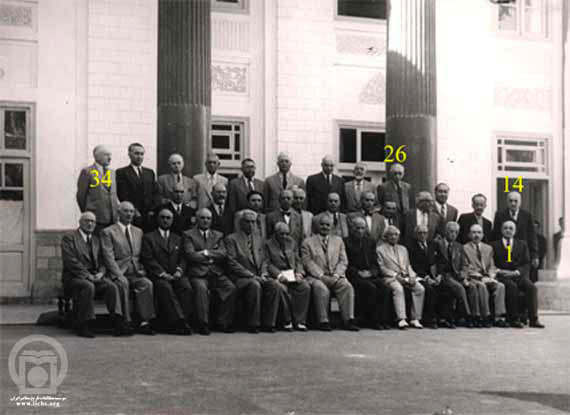
Seyyed Hassan Taqizadeh
AA [11-2935]
Members of the first Senate in front of Majlis, 1952: 1. Ali Moayyed Sabeti, 2. Mohammad Ali Nezam Mafi, 3. Nassrollah Khal'atbari, 4. HassanAli Kamal Hedayat, 5. Sadeq Sadeq, 6. Mehdi Malekzadeh, 7. Hassan Taqizadeh, 8. Hossein Samiei, 9. Hossein Dadgar, 10. Mohammad Nakhjavan, 11. Ahmad Amir Ahmadi, 12. Mohammad Ali Moqaddam, 13. AliReza Saba, 14. Kazem Jalili, 15. Mehdi MoshirFatemi, 16. Mohammad Nasser Qashqai, 17. Qassem Qassem, 18. Ismail Sang, 19. Sadeq Rezazadeh Shafaq, 20. Assad-ollah Yamin Esfandiari, 21. Ataollah Ruhi, 22. Mehdi Farrokh, 23. Hossein Naqavi,, 24. Azizollah Zaram, ,25. Javad Imami Khoi, 26. Mohammad Mehdi Mahvi, 27. AbdolMehdi Tabatabi, 28. Rezaqoli Divanbeigui, 29. Amanollah Jahaniani, 30. Mohammad Hassan Foruzanfar, 31. Ibrahim Hakimi, 32. Eissa Sorush, 33. Abbas Massudi, 34. Eissa Seddiq
Members of the first Senate in front of Majlis, 1952: 1. Ali Moayyed Sabeti, 2. Mohammad Ali Nezam Mafi, 3. Nassrollah Khal'atbari, 4. HassanAli Kamal Hedayat, 5. Sadeq Sadeq, 6. Mehdi Malekzadeh, 7. Hassan Taqizadeh, 8. Hossein Samiei, 9. Hossein Dadgar, 10. Mohammad Nakhjavan, 11. Ahmad Amir Ahmadi, 12. Mohammad Ali Moqaddam, 13. AliReza Saba, 14. Kazem Jalili, 15. Mehdi MoshirFatemi, 16. Mohammad Nasser Qashqai, 17. Qassem Qassem, 18. Ismail Sang, 19. Sadeq Rezazadeh Shafaq, 20. Assad-ollah Yamin Esfandiari, 21. Ataollah Ruhi, 22. Mehdi Farrokh, 23. Hossein Naqavi,, 24. Azizollah Zaram, ,25. Javad Imami Khoi, 26. Mohammad Mehdi Mahvi, 27. AbdolMehdi Tabatabi, 28. Rezaqoli Divanbeigui, 29. Amanollah Jahaniani, 30. Mohammad Hassan Foruzanfar, 31. Ibrahim Hakimi, 32. Eissa Sorush, 33. Abbas Massudi, 34. Eissa Seddiq
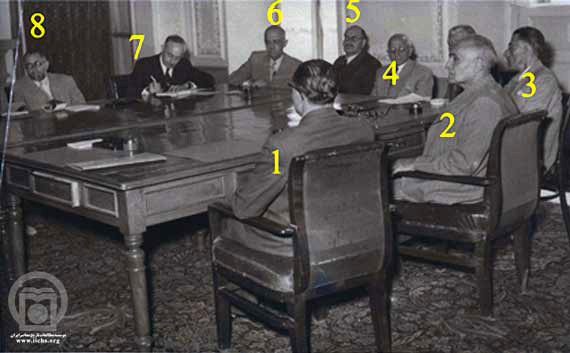
Seyyed Hassan Taqizadeh
AA [4-3708]
Formal session of the first Senate commission: 1. Ibrahim Khaje Nouri, 2. Hassan Taqizadeh, 3. Aboulqassem Najm, 4. HassanAli Kamal Hedayat, 5. Saeed Malek, 6. Mehdi Farrokh, 7. Ali Moayyed Sabeti, 8. Mohammad Hassan Foruzanfar
Formal session of the first Senate commission: 1. Ibrahim Khaje Nouri, 2. Hassan Taqizadeh, 3. Aboulqassem Najm, 4. HassanAli Kamal Hedayat, 5. Saeed Malek, 6. Mehdi Farrokh, 7. Ali Moayyed Sabeti, 8. Mohammad Hassan Foruzanfar
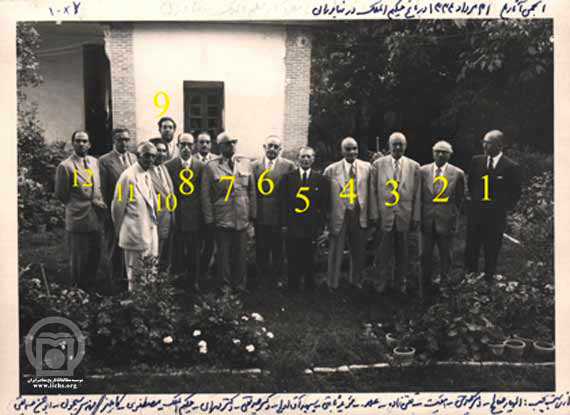
Seyyed Hassan Taqizadeh
AA [1-1394]
Members of Iran's National Monuments society at Hakim-ol-Molk's house in Niavaran: 1. Allahyar Saleh, 2. Eissa Sadiq Alam, 3. Ali Hey'at, 4. Hassan Taqizadeh, 5. Hossein Ala, 6. Ali Mo'ayyed Sabeti, 7. Farajollah Aqevli, 8. GholamHossein Seddiqi, 9. Hushang Seihun, 10. Mahmud Mehran, 11. Ibrahim Hakimi, 12. AboulHassan Seddiqi
Members of Iran's National Monuments society at Hakim-ol-Molk's house in Niavaran: 1. Allahyar Saleh, 2. Eissa Sadiq Alam, 3. Ali Hey'at, 4. Hassan Taqizadeh, 5. Hossein Ala, 6. Ali Mo'ayyed Sabeti, 7. Farajollah Aqevli, 8. GholamHossein Seddiqi, 9. Hushang Seihun, 10. Mahmud Mehran, 11. Ibrahim Hakimi, 12. AboulHassan Seddiqi
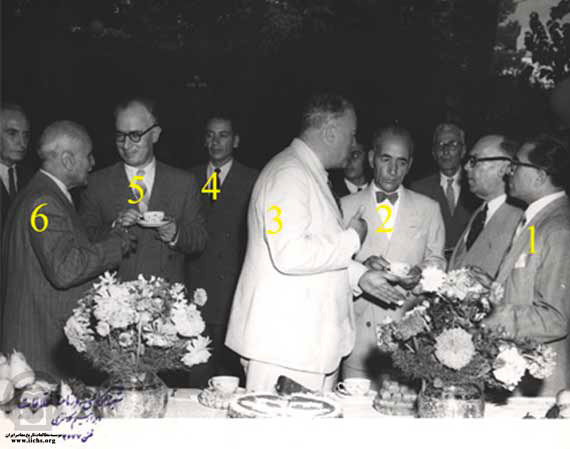
Seyyed Hassan Taqizadeh
AA [11-6098]
Richard Stokes (the British special agent in oil related matters) and some members of Iran's first Senate in a party (1951): 1. Ibrahim Khajeh Nuri, 2. Sadeq Rezazadeh Shafaq, 3. Richard Stokes, 4. Ali Abtin, 5. Ahmad Matin Daftari, 6. Hassan TaqiZadeh
Richard Stokes (the British special agent in oil related matters) and some members of Iran's first Senate in a party (1951): 1. Ibrahim Khajeh Nuri, 2. Sadeq Rezazadeh Shafaq, 3. Richard Stokes, 4. Ali Abtin, 5. Ahmad Matin Daftari, 6. Hassan TaqiZadeh
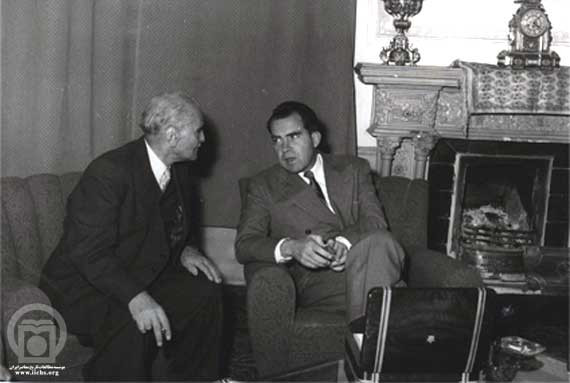
Seyyed Hassan Taqizadeh
N [161-6]
Richard Nixon, American vice-president and Hassan Taqizadeh (a deputy to Iranian Senate)
Richard Nixon, American vice-president and Hassan Taqizadeh (a deputy to Iranian Senate)
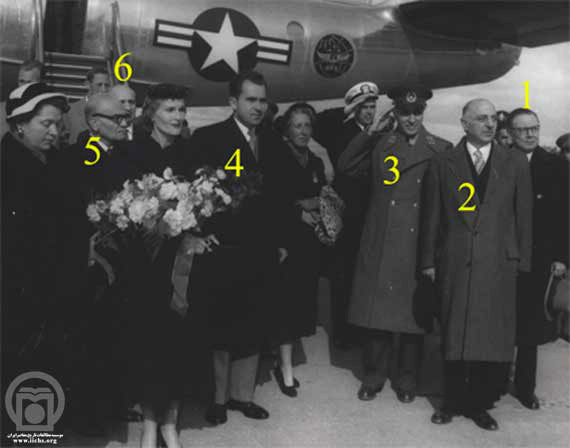
Seyyed Hassan Taqizadeh
Z [115-2241]
Fazlollah Zahedi (prime minister) welcoming Richard Nixon (American Vice president) and his wife at Mehrabad airport (Dec. 1953): 1. Abdollah Entezam, 2. Yadollah Azodi, 3. Fazlollah Zahedi, 4. Ricard Nixon, 5. Hassan Taqizadeh, 6. Louie Henderson
Fazlollah Zahedi (prime minister) welcoming Richard Nixon (American Vice president) and his wife at Mehrabad airport (Dec. 1953): 1. Abdollah Entezam, 2. Yadollah Azodi, 3. Fazlollah Zahedi, 4. Ricard Nixon, 5. Hassan Taqizadeh, 6. Louie Henderson
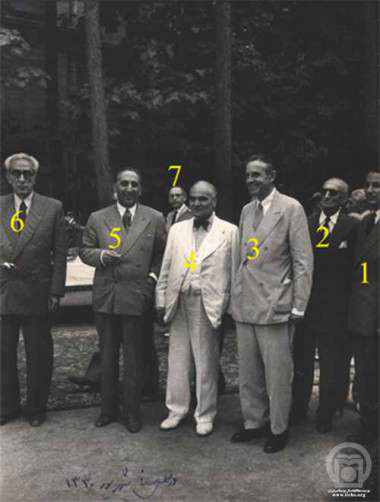
Seyyed Hassan Taqizadeh
AA [11-2767]
Oral Hariman (American special envoy to Iran) in company with Seyyed Hassan Taqizadeh and some deputies of the first Senate (1951): 1. Ali Abtin, 2. Amir Alam, 3. Oral Hariman, 4. Hassan Taqizadeh, 5. Javad Bushehri, 6. Hossein Dadgar, 7. Mahmud Hessabi
Oral Hariman (American special envoy to Iran) in company with Seyyed Hassan Taqizadeh and some deputies of the first Senate (1951): 1. Ali Abtin, 2. Amir Alam, 3. Oral Hariman, 4. Hassan Taqizadeh, 5. Javad Bushehri, 6. Hossein Dadgar, 7. Mahmud Hessabi
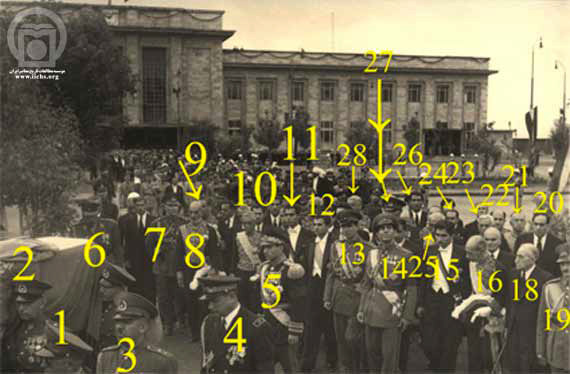
Seyyed Hassan Taqizadeh
AA [1-2036]
Reza Shah Pahlavi's funeral on Rah Ahan Square in Tehran: 1. QolamHossein Afkhami, 2. Hassan Baqai, 3. Ahmad Zanganeh, 4. Mahmud Khosravani, 5. .Mohammad Reza Pahlavi, 6. Jafar Shafeqqat, 7. Fazl-ollah Zahedi, 8. Mohsen Sadr, 9. Manuchehr Eqbal, 10. Ibrahim Hakimi, 11. Ahmad Reza Pahlavi, 12. Abdol-Reza Pahlavi, 13. QolamReza Pahlavi, 14. AliReza Pahlavi, 15. HamidReza Pahlavi,, 16. RajabAli Mansur, 17. Hassan Taqizqdeh, 18. Abolfath Valatabar, 19. Morteza Yazdan Panah, 20. Abdollah Moazzami, 21. Anushirvan Sepahbodi, 22. Yussef Shokrayi, 23. Amanollah Ardalan, 24. Ali Izadi, 25. AliAsghar Nafissi, 26. Ahmad Dehqan, 27. Mohammad Shah Bakhti, 28. Abbas- qoli Golshaian, 29. Agha Khan Ashrafi
Reza Shah Pahlavi's funeral on Rah Ahan Square in Tehran: 1. QolamHossein Afkhami, 2. Hassan Baqai, 3. Ahmad Zanganeh, 4. Mahmud Khosravani, 5. .Mohammad Reza Pahlavi, 6. Jafar Shafeqqat, 7. Fazl-ollah Zahedi, 8. Mohsen Sadr, 9. Manuchehr Eqbal, 10. Ibrahim Hakimi, 11. Ahmad Reza Pahlavi, 12. Abdol-Reza Pahlavi, 13. QolamReza Pahlavi, 14. AliReza Pahlavi, 15. HamidReza Pahlavi,, 16. RajabAli Mansur, 17. Hassan Taqizqdeh, 18. Abolfath Valatabar, 19. Morteza Yazdan Panah, 20. Abdollah Moazzami, 21. Anushirvan Sepahbodi, 22. Yussef Shokrayi, 23. Amanollah Ardalan, 24. Ali Izadi, 25. AliAsghar Nafissi, 26. Ahmad Dehqan, 27. Mohammad Shah Bakhti, 28. Abbas- qoli Golshaian, 29. Agha Khan Ashrafi
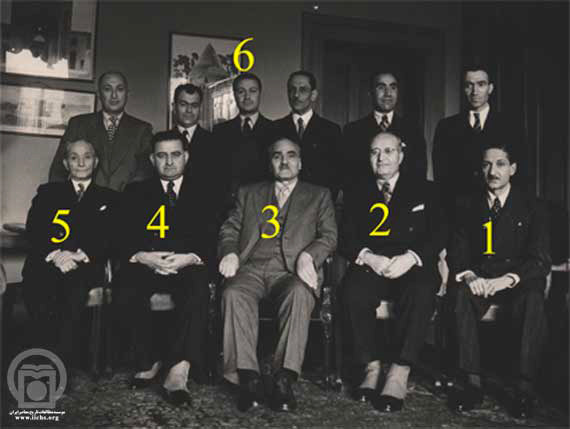
Seyyed Hassan Taqizadeh
AA [11-5825]
Taqizadeh and the members of Iranian delegation to the United Nations to forward Iranian petition against the Russian occupation of Iranian Azerbaijan (1947) 1. Nassrollah Entezam, 2. Bagher Kazemi, 3. Hassan Taqizadeh, 4. Ali Soheili, 5. Mostafa Adl, 6. AbbasAli Khalatbari
Taqizadeh and the members of Iranian delegation to the United Nations to forward Iranian petition against the Russian occupation of Iranian Azerbaijan (1947) 1. Nassrollah Entezam, 2. Bagher Kazemi, 3. Hassan Taqizadeh, 4. Ali Soheili, 5. Mostafa Adl, 6. AbbasAli Khalatbari
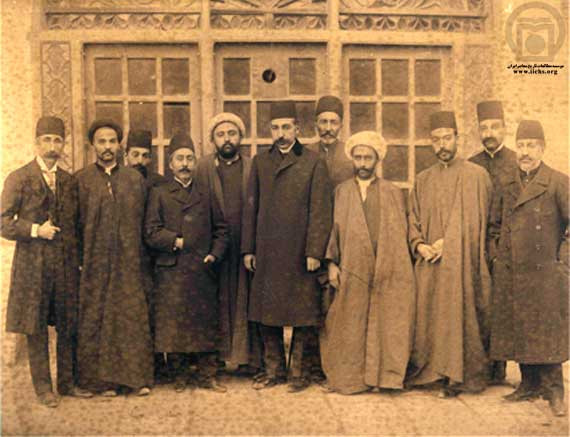
Seyyed Hassan Taqizadeh
AA [1-767]
Taqizadeh and some members of members of first Majlis: from the right Mohammad Qoli Mokhber-ol-Molk (Hedayat), Mohammad Mazaher, Mirza Agha Farshchi, Ibrahim Agha Tabrizi, Morteza Qoli Na'ini, Hassan Vossuq, Reza Mahdavi, Sadeq Sadeq, HassanAli Kamal Hedayet, Hassan Taqizadeh and Hassan Banki
Taqizadeh and some members of members of first Majlis: from the right Mohammad Qoli Mokhber-ol-Molk (Hedayat), Mohammad Mazaher, Mirza Agha Farshchi, Ibrahim Agha Tabrizi, Morteza Qoli Na'ini, Hassan Vossuq, Reza Mahdavi, Sadeq Sadeq, HassanAli Kamal Hedayet, Hassan Taqizadeh and Hassan Banki
iichs.ir/vdcj.oetfuqemh29zu.html
